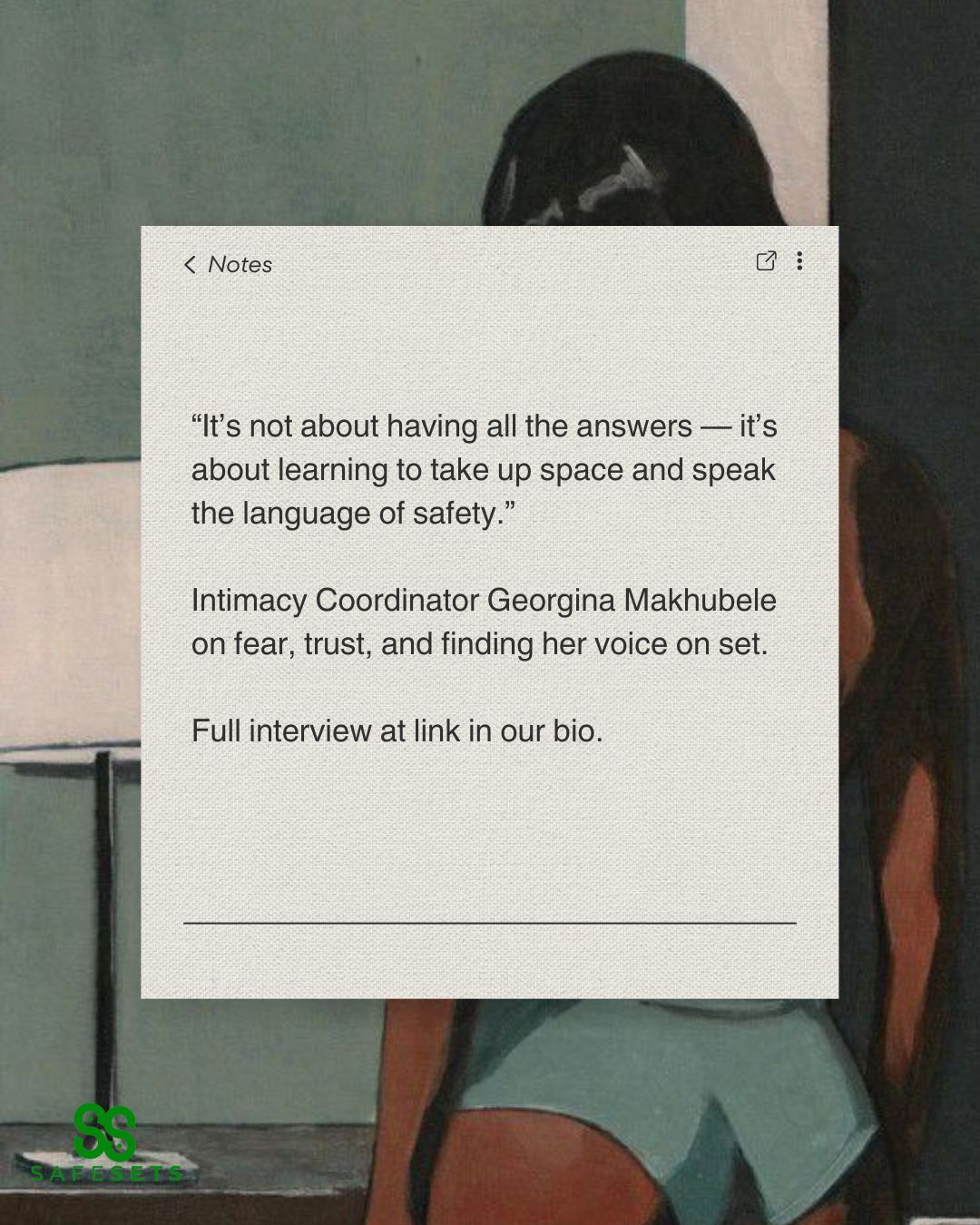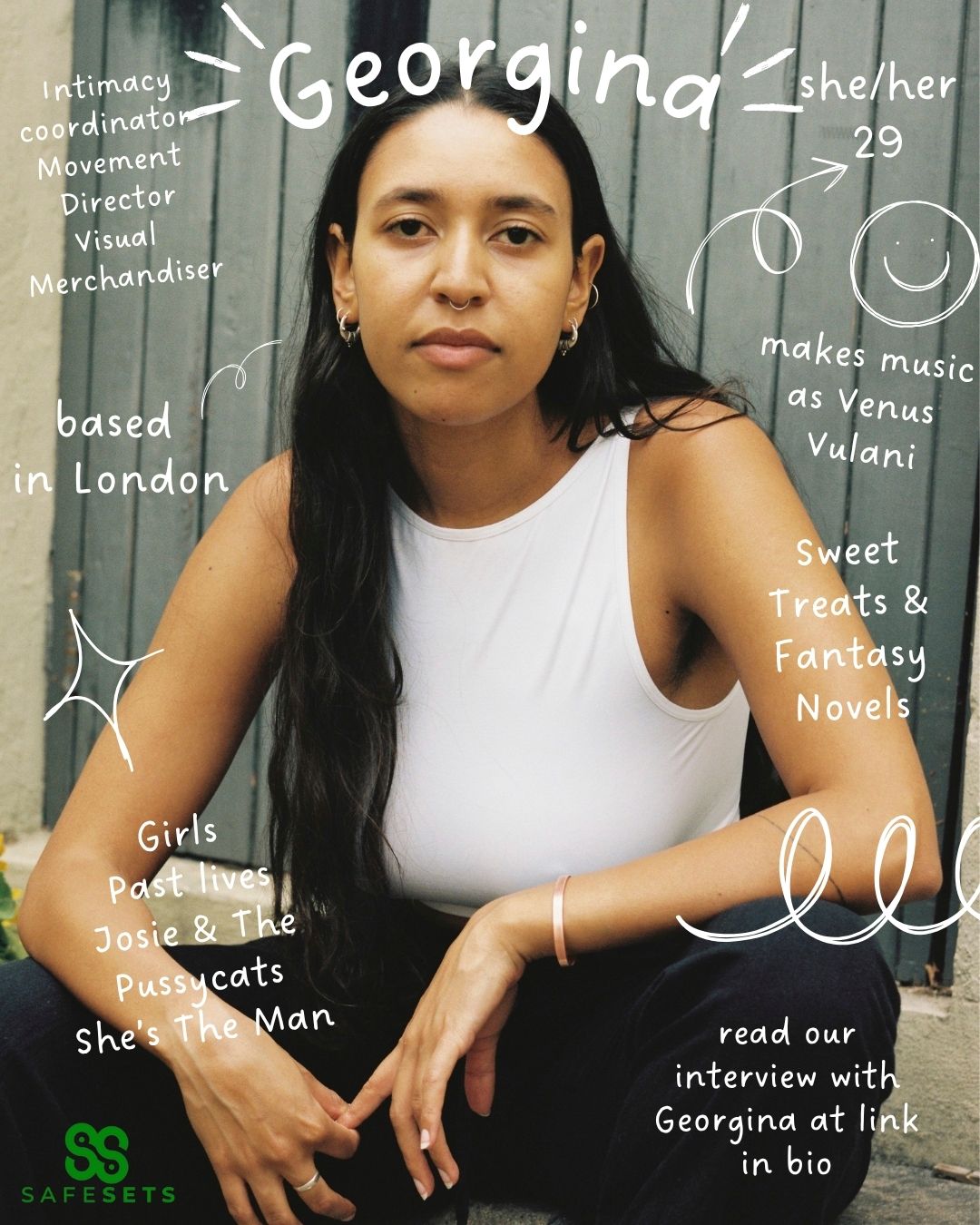Learning to Speak the Language of Safety - an interview with Georgina Makhubele
In the evolving world of intimacy coordination, new voices are emerging with quiet confidence and deep care. South African-born, UK-based intimacy coordinator Hlamalani Georgina Graaff Makhubele, speaks with refreshing honesty about fear, trust, and finding her voice on set. In conversation with fellow intimacy coordinator Sara Blecher, she reflects on first jobs, cultural sensitivity, and the courage to take up space.
Sara: Let's start at the beginning. What was your very first experience coordinating intimacy on a film set?
Georgina: Being completely green to the film and television industry, finding my first job was a real challenge. It's a role that requires a lot of trust on the production's side and immense courage for a new IC to hold that space. I had been searching for some time and eventually found a job on a student film through Facebook.
The intimacy required was physical touch and kissing, and although I felt very capable, I had so many nerves. The first day on any job is scary, but a job where the physical, emotional and psychological stakes are so high can be overwhelming. Being on set for the first time was quite intimidating, but everyone was really friendly and still learning themselves which was a comfort. I had to learn very quickly to trust myself in the role.
Sara: Let's start at the beginning. What was your very first experience coordinating intimacy on a film set?
Georgina: Being completely green to the film and television industry, finding my first job was a real challenge. It's a role that requires a lot of trust on the production's side and immense courage for a new IC to hold that space. I had been searching for some time and eventually found a job on a student film through Facebook.
The intimacy required was physical touch and kissing, and although I felt very capable, I had so many nerves. The first day on any job is scary, but a job where the physical, emotional and psychological stakes are so high can be overwhelming. Being on set for the first time was quite intimidating, but everyone was really friendly and still learning themselves which was a comfort. I had to learn very quickly to trust myself in the role.
Sara: How has your approach changed since that first job?
Georgina: Each project feels like a step up in terms of challenge and my confidence is growing with every job. The more work I do I've realised it's not about having all the answers - it's about listening and knowing when and how to step in.
I'm getting comfortable with taking up more space on set - speaking up and intervening when necessary. That's not always been easy for me. I've had to learn that advocating for safety sometimes means being assertive in uncomfortable situations.
Sara: Have you found that your identity — being a young, mixed-race South African woman — affects how people perceive you on set?
Georgina: Not overtly. Like all people I do wonder how I'm being perceived in professional environments. I think it's amplified in any space where you feel like you stick out and your identifiers (race, gender etc.) are the outlier.
I've only had one negative experience with an actor who openly questioned my presence on set. Upon reflection I wasn't sure whether she'd have treated a different IC - who looked like her and was of a similar age - in the same way. With that being said, the IC role is still so new and she could have had many other reasons to question the presence of one.
On the flip side, there's a certain amount of trust that is automatically placed in me as a woman IC. Of course to gain real trust with a cast and crew it has to be earned, but that initial assumption is something I benefit from in this role. Perception is always at play in determining who people feel safe with and who they trust with their vulnerability. Sometimes it's not personal and sometimes it is. I try to carry that awareness without letting it overwhelm me.

Sara: What keeps you grounded in this work, especially when the stakes feel high?
Georgina: I remind myself that I'm still learning - I'll always be learning. Every set is different, every director has a new language, and every actor will come with different needs. I know I have to arrive prepared, stay present, and rely on my toolkit. Ultimately, trust the process!
Every challenge is an opportunity for growth and I reckon the growth will never stop. What is particularly grounding is knowing that this work prioritises the human behind the role, the person behind the position, and the art is benefited because of it. I love that.
Sara: You recently worked on a short film that dealt with abstinence and desire. What was that experience like?
Georgina: I really loved working on this project. It was a story about temptation and religious values - taking on a very specific lens of intimacy. Upon first reading the script, I couldn't relate to the framing; I don't believe sex is inherently bad and I don't think it should be treated as such.
There is so much shame surrounding sex already, so I believe storytelling around it needs to be handled with care. But after our conversations I realised the director was exploring that exact moral tension rather than making a black and white judgment. The care was definitely there - the production was accommodating, supportive and prioritised preparation. It was a great learning experience for me in the power of the process, not just the performance.
Sara: And where do you see yourself going from here?
Georgina: As a freelancer my focus is always spread among various different jobs and projects, so I see many directions for myself. When it comes to intimacy I want to keep being challenged and hopefully level up - get more consistent, higher budget, longer form projects. I'll continue working as a portfolio creative and remain open to new opportunities, but I'd also love to make my own work and perform again.
There's a quiet steadiness in how Georgina speaks — a balance of humility and conviction. She's part of a growing cohort redefining how intimacy looks and feels on screen, not by shouting the loudest, but by listening hardest. In her world, safety isn't a checklist — it's a language, and Georgina is learning to speak it fluently.
Interviewed in October 2025 by Sara Blecher

